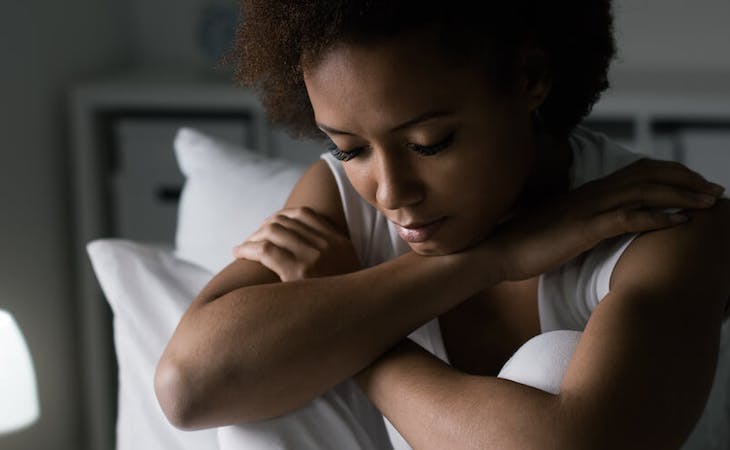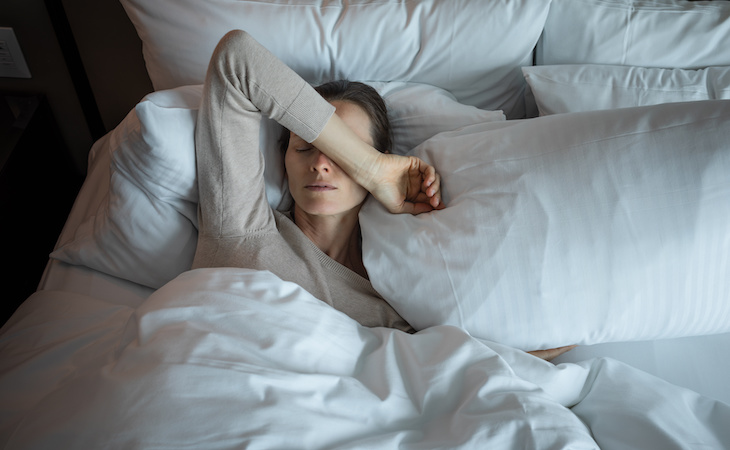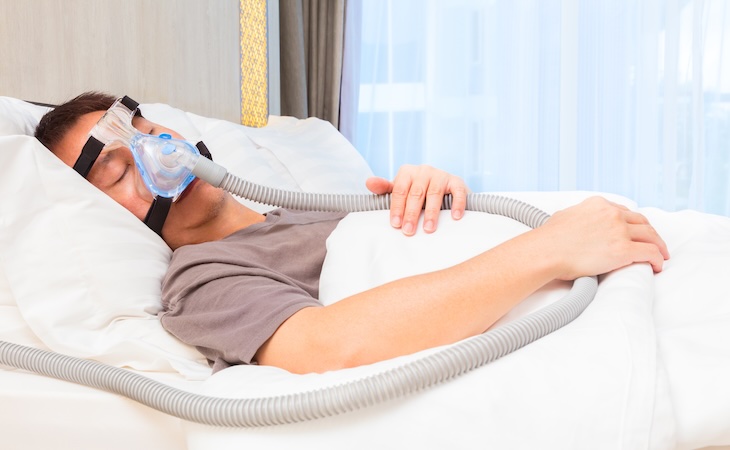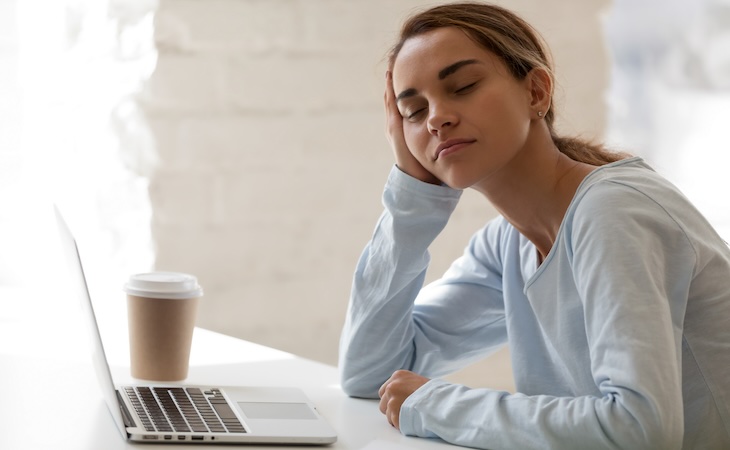Life is exhausting. Whether you’re raising children, working a physically or mentally taxing job, or constantly monitoring the news cycle, climbing into bed at night is the only time many of us get to relax and retreat.
And yet one in three Americans don’t get enough sleep (seven hours per night), according to the Centers for Disease Control and Prevention. This is an even more pronounced issue for Black people, who get less sleep than any other group.
Joel D. Gould, DDS, who specializes in treating sleep disorders like bruxism, insomnia, and sleep apnea, says there are many reasons why Black Americans often don’t get the recommended seven to nine hours of sleep per night.
Black people are often more exposed to environmental sleep disruptors
For starters, Gould, author of the forthcoming book, The Modern Epidemic, which details the link between poor sleep and vitamin D deficiency, explains the circadian rhythm regulating our sleep/wake cycle can be thrown off by environmental factors.
City dwellers, who deal with lots of noise and other stress-inducing conditions, for instance, often get less sleep than those in the countryside or suburbs—and research shows Black Americans are more likely to live in inner cities.
“Humans are sensors to the environment,” says Gould. “Light comes through our eyes, sunlight comes to our skin, we eat food, we do different activities. So our bodies are very reactive to the world around us.” These kids of environmental inputs disrupt our circadian rhythm and make it hard to fall and stay asleep.
City dwellers, who deal with lots of noise and other stress-inducing conditions, often get less sleep than those in the countryside or suburbs—and research shows Black Americans are more likely to live in inner cities.
Black people also often have less access to nutritious foods
Sleep deprivation in Black Americans goes beyond environmental factors and can also be affected by policies and societal issues.
This is something Gould noticed firsthand when he moved from Canada to the United States years ago. “There are ways that Black and brown people are being kept unhealthy,” he says. “This includes the supplementation of low-price foods that are loaded with toxins, and it’s all the wrong food.”
What Gould is referring to is the prevalence of “food deserts” in the U.S. Per the Food Empowerment Project, a food desert is a geographic area where residents’ access to affordable, healthy foods, such as fruits and vegetables, is restricted or simply doesn’t exist due to a lack of grocery stores within a convenient distance. So instead, residents have to turn to less healthy options.
It’s worth noting eight out of 10 of the U.S. cities that get the least sleep are also among the 20 cities that have over a 50% Black population. Some of these cities, such as Detroit, which is more than 80% Black, are also food deserts.
What does that have to do with sleep? Gould believes the quality of food we consume has an impact on our gut microbiome and our overall wellbeing, all of which can impact sleep.
Eight out of 10 of the U.S. cities that get the least sleep are also among the 20 cities that have over a 50% Black population.
Black people are at higher risk for vitamin D deficiencies
There’s another factor at play that can affect the gut microbiome, and consequently, healthy sleep.
Gould explains insufficient vitamin D, which we often get from sun exposure, impacts the gut microbiome, and inhibits the production of the sleep chemicals melatonin, dopamine, serotonin, and GABA.
Studies show Black people have the highest percentage of vitamin D deficiencies of any ethnic group. Research indicates those with darker complexions require three to five times more sun exposure to get the same amount of vitamin D as fairer-skinned individuals. This is because melanin is natural sunscreen, and it can lead to malabsorption.
Studies show Black people have the highest percentage of vitamin D deficiencies of any ethnic group.
Black people have to deal with racism on a daily basis
Racism can lead to a host of mental health conditions that disrupt sleep, including anxiety and depression. In fact, according to the National Council for Behavioral Health, depression is the most common mental health condition among people of color, with Black people reporting a 27.1% rate of the disease.
The added burden of implicit and overt racism can also lead to people of color suffering from weathering, a term for the physiological toll that is taken by daily stress and the body being in “flight or fight” mode.
Jameta Barlow, PhD, community health psychologist, explains that weathering and stress are catalysts for cardiometabolic conditions, such as diabetes and hypertension—both of which have the potential to interfere with sleep.
Racism can lead to a host of mental health conditions that disrupt sleep, including anxiety and depression.
Managing the stress
Barlow, who is a Black health researcher and expert on weathering, often tells her clients that stress management is a top priority for self-care. She also reminds her clients that there is a difference between sleep and rest. As the National Sleep Foundation explains, rest is sometimes called quiet wakefulness. It involves closing your eyes for a few minutes to calm your body and mind.
“We need more rest to activate our parasympathetic nervous system, which helps us to address stress and decrease the amount of cortisol in the body,” says Barlow. Too much cortisol—the stress hormone—is a result of weathering.
Here is her technique for calming down, which can be achieved in a matter of minutes: “I recommend mindfulness exercises for the body’s rest: 5-7-9 is one. Participants can breathe in for five seconds, rest for seven seconds, and release for nine seconds. This has been shown to clinically reduce the amount of cortisol in the body.” Less cortisol, in turn, can help you get a better night’s sleep.
Creating the ideal sleep environment
Gould, meanwhile, details how one can create an atmosphere conducive to counting sheep: “Number one: We want to have a cool, quiet, comfortable place with no blue light—absolutely pitch black,” he says. “Number two: We want to be as comfortable as we can be.”
This comfort can be achieved by setting your thermostat so that the house isn’t too warm and turning down extra light. “If you do things that will disrupt that pattern, like watching TV, even glancing at your cell phone, or even looking at the little lights on your electronic equipment, they are telling your brain to stop producing melatonin, and that’s your sleep hormone.”
The bottom line on racism and its effects on sleep
There are things Black Americans can do to get better shuteye, from getting tested for vitamin D levels to making sure our bedrooms are conducive to sleep. But, the fact of the matter is, until society is free of implicit bias and endemic racism, many people of color will continue to lose out on a good night’s sleep.
Learn what health experts have to say about the importance of addressing systemic racism.




